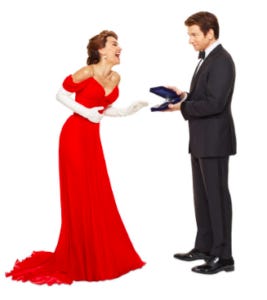'PRETTY WOMAN' BOTCHED BY ALL-MALE CREATIVE TEAM: REVIEW

Photo: Andrew Eccles
Pretty Woman: The Musical, the over-amplified wannabe tourist trap that opened Thursday at the Nederlander Theatre, illustrates the limits of vision-free Broadway producing.
The music is monotonous and draining, the book simplistic and clichéd (much more so than the film), and the acting wooden. The best elements are its Vegas-flashy sets (by David Rockwell) and its choreography (by director Jerry Mitchell).
This Pretty Woman is less a musical than a high-end diorama.
The story retains the shape of the beloved 1990 blockbuster upon which the musical’s based – the film’s screenwriter, J.F. Lawton, and director, the late Garry Marshall, co-wrote the book. It’s the tale of a sex worker, Vivian (Samantha Barks), who’s taken up by a corporate raider, Edward (Andy Karl), who shows her the high life and successfully facilitates her evolution as a human being.
Yes, the story feels dated – even the T-shirts for sale read, somewhat desperately, “Bold/Fierce/Funny/Strong/Pretty Woman.” But oddly, other than some cosmetic adjustments, the plot is the same – rich boy meets poor girl, saves her, then she “saves him right back” (oh, please). There's nothing inherently wrong with an all-male (and over-50) creative team writing a show called Pretty Woman, but it's not hard to connect the dots on how this same old story stayed so same old.
The songs, by Bryan Adams and Jim Vallance, are ‘80s pastiche that function as dramatic afterthoughts. After a scene in which Vivian gives Edward directions, and he becomes confused, he is given a solo ballad (the first of oh-so-many) in which he helpfully sings, “I asked her for directions / And now I feel confused.” The songs are flat and unvaried, and some are just plain dumb. A hail-Mary attempt at granting Vivian agency results in the hair-raising lyric “It’s true, I sold my body / But I never sold my soul.”
The most obvious problem is that Barks isn’t given the space to sink her teeth into the iconic Julia Roberts role that audiences so loved. But the slapdash structure is also at fault. Not one section of the film has been translated to song in any kind of meaningful way. Instead, the numbers are effectively commentary on the scenes that precede them. It isn’t like watching Pretty Woman so much as watching other people watch Pretty Woman.
Karl, memorably of Groundhog Day, and Barks, so lovely in the Les Miserables movie, are wasted here – though they both sing beautifully. Karl puts most of his energy into becoming as boring as Richard Gere’s character in the film, and largely succeeds. Barks, given the unenviable task of satisfying Julia Roberts nostalgia, winds up a blank whose most interesting character development is her many changes of costume (designed by Gregg Barnes, though also little changed from the movie).
Eric Anderson shows up, playing both Héctor Elizondo and Abdul Salaam El Razzac’s guardian-angel roles from the movie, in the only nod to the fairy-tale aspects of the story. Still, even he feels earthbound. The whole cast seems united in their joyless manufactured enthusiasm. Maybe Vivian never sold her soul, but there’s something so soulless about Pretty Woman itself that it comes to feel less celebratory than stultifying.

